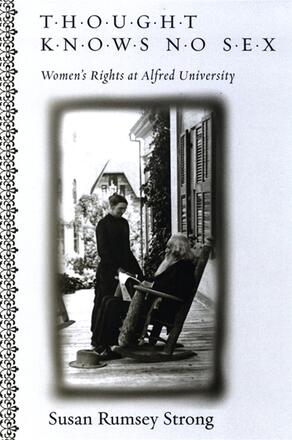
Thought Knows No Sex
Women's Rights at Alfred University
Alternative formats available from:
Grounded in student experiences at nineteenth-century Alfred University, this social history explores the origins of women’s higher education and the rural roots of reform.
Description
"The essential powers of the spirit are neither masculine nor feminine, but human, sexless. Thought knows no sex. " — Jonathan Allen, President, Alfred University (1867–1892)
One of the nation's first coeducational colleges and an early leader in women's higher education, Alfred University offered a remarkably egalitarian environment for women in an era when their voices were silenced elsewhere. Founded in 1836 as a select school in rural western New York State, it embraced women's public speaking, women's rights, and even suffrage. Susan Rumsey Strong shares the history of nineteenth-century Alfred, explaining its uniquely liberal environment by focusing on the individuals who created it and the sociocultural factors that contributed to it. Shared labor, a dense kinship system, a separatist denomination, independence from that denomination, liberal theology, and a secular mission all supported an explicit ideology of equality. Grounded in student experiences of the period, this social history explores the origins of women's higher education and the rural roots of reform. Along the way, Strong allows individual voices from diaries, letters, and recollections to recount their own stories, revealing the excitement, hopes, and fears felt by some of the first women to aspire to higher education.
At Alfred University, Susan Rumsey Strong is Reference Librarian, Herrick Memorial Library, and has also served as Vice-President and Associate Provost.
Reviews
"Strong's book is of great value to the study of academies and early nineteenth-century higher education and gives an interesting depiction of the lives and beliefs of the reformers who led the institution. " — H-Net Reviews (H-Education)
"This terrific book offers a significant contribution to historical research on gender and higher education in America. It will be valuable to historians of education, of women and gender, and of New York State. I cannot imagine that any book could compete with it in terms of Alfred University, but it also makes a unique contribution beyond what a typical institutional history offers. It's social history at its best. " — Benjamin Justice, author of The War That Wasn't: Religious Conflict and Compromise in the Common Schools of New York State, 1865–1900